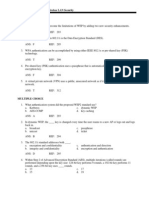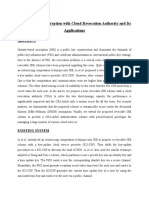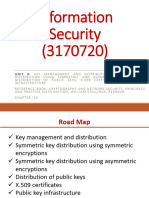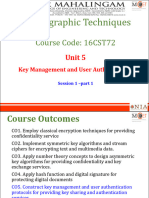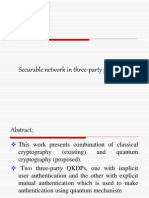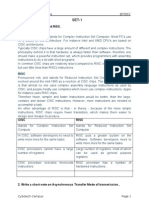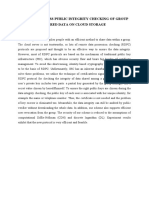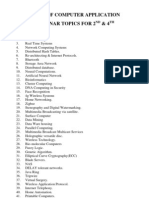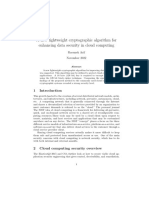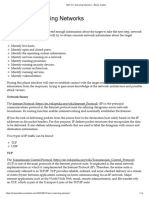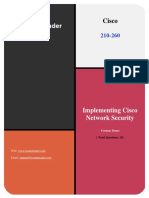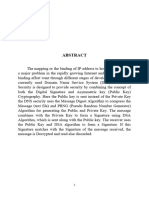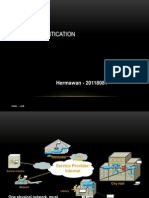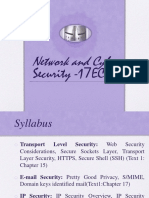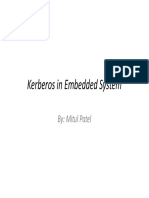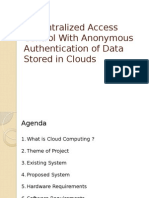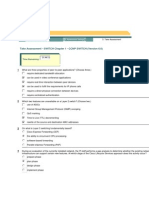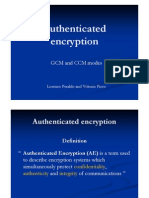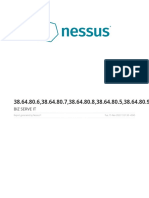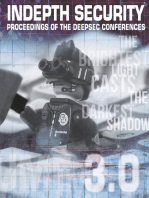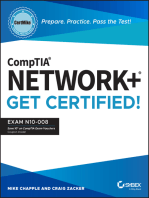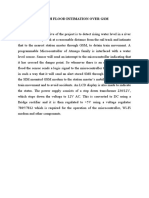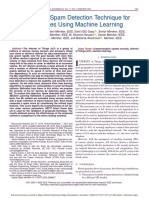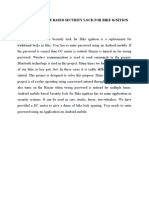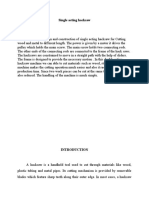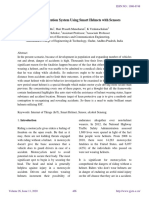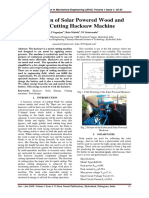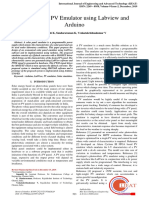0 ratings0% found this document useful (0 votes)
14 viewsSecure Transmission Using Trusted Protocols
Secure Transmission Using Trusted Protocols
Uploaded by
RamsathayaThis document proposes two new quantum key distribution protocols (QKDPs) that improve security and efficiency. The protocols provide implicit or explicit authentication between three parties. They increase security against attacks while reducing the number of communication rounds, allowing parties to share long-term secrets. The document also introduces a new "Unbiased-Chosen Basis" assumption to prove the security of the proposed schemes.
Copyright:
© All Rights Reserved
Available Formats
Download as DOC, PDF, TXT or read online from Scribd
Secure Transmission Using Trusted Protocols
Secure Transmission Using Trusted Protocols
Uploaded by
Ramsathaya0 ratings0% found this document useful (0 votes)
14 views2 pagesThis document proposes two new quantum key distribution protocols (QKDPs) that improve security and efficiency. The protocols provide implicit or explicit authentication between three parties. They increase security against attacks while reducing the number of communication rounds, allowing parties to share long-term secrets. The document also introduces a new "Unbiased-Chosen Basis" assumption to prove the security of the proposed schemes.
Original Description:
MCA
Original Title
9.Secure Transmission
Copyright
© © All Rights Reserved
Available Formats
DOC, PDF, TXT or read online from Scribd
Share this document
Did you find this document useful?
Is this content inappropriate?
This document proposes two new quantum key distribution protocols (QKDPs) that improve security and efficiency. The protocols provide implicit or explicit authentication between three parties. They increase security against attacks while reducing the number of communication rounds, allowing parties to share long-term secrets. The document also introduces a new "Unbiased-Chosen Basis" assumption to prove the security of the proposed schemes.
Copyright:
© All Rights Reserved
Available Formats
Download as DOC, PDF, TXT or read online from Scribd
Download as doc, pdf, or txt
0 ratings0% found this document useful (0 votes)
14 views2 pagesSecure Transmission Using Trusted Protocols
Secure Transmission Using Trusted Protocols
Uploaded by
RamsathayaThis document proposes two new quantum key distribution protocols (QKDPs) that improve security and efficiency. The protocols provide implicit or explicit authentication between three parties. They increase security against attacks while reducing the number of communication rounds, allowing parties to share long-term secrets. The document also introduces a new "Unbiased-Chosen Basis" assumption to prove the security of the proposed schemes.
Copyright:
© All Rights Reserved
Available Formats
Download as DOC, PDF, TXT or read online from Scribd
Download as doc, pdf, or txt
You are on page 1of 2
Secure Transmission Using Trusted Protocols
ABSTRACT
This work presents quantum key distribution protocols (QKDPs) to safeguard
security in large networks, ushering in new directions in classical cryptography and
quantum cryptography. Two three-party QKDPs, one with implicit user authentication
and the other with explicit mutual authentication, are proposed to demonstrate the merits
of the new combination, which include the following:
1) Security against such attacks as man-in-the-middle, eavesdropping and replay.
2) Efficiency is improved as the proposed protocols contain the fewest number of
communication rounds among existing QKDPs.
3) Two parties can share and use a long-term secret (repeatedly). To prove the
security of the proposed schemes, this work also presents a new primitive called the
Unbiased-Chosen Basis (UCB) assumption.
In quantum cryptography, quantum key distribution protocols (QKDPs) employ quantum
mechanisms to distribute session keys and public discussions to check for eavesdroppers
and verify the correctness of a session key. However, public discussions require
additional communication rounds between a sender and receiver and cost precious quits.
By contrast,
classical cryptography provides convenient techniques that enable efficient key
verification and user authentication.
SYSTEM REQUIREMENTS
HARDWARE REQUIREMENTS
Processor : Pentium III / IV
Hard Disk : 40 GB
Ram : 256 MB
Monitor : 15VGA Color
Mouse : Ball / Optical
Keyboard : 102 Keys
SOFTWARE REQUIREMENTS
Operating System : Windows XP professional
Front End : Microsoft Visual Studio .Net 2005
Language : Visual C#.Net
Back End : SQL Server 2000
You might also like
- 7230 Repaso Exam 2Document10 pages7230 Repaso Exam 2iuser1900100% (1)
- Chapter 9Document7 pagesChapter 9mad maranNo ratings yet
- A Study On Information Security Using Public Key Information at Brisk Techno Cloud StorageDocument10 pagesA Study On Information Security Using Public Key Information at Brisk Techno Cloud StorageBala SudhakarNo ratings yet
- Identity-Based Encryption With CloudDocument4 pagesIdentity-Based Encryption With CloudPidikiti Surendra BabuNo ratings yet
- Lecture 13-14 Digital Signature ApplicationsDocument31 pagesLecture 13-14 Digital Signature ApplicationsAmr HatemNo ratings yet
- Unit 8Document87 pagesUnit 8testNo ratings yet
- Identity-Based Encryption With CloudDocument4 pagesIdentity-Based Encryption With CloudPidikiti Surendra BabuNo ratings yet
- Dovetail Dumps Latest Phase2Document47 pagesDovetail Dumps Latest Phase2Arun Tez Marata50% (2)
- Crypto (Unit 5)Document127 pagesCrypto (Unit 5)Sudharshni BalasubramaniyamNo ratings yet
- Securable Network in 3 Party NetworkDocument12 pagesSecurable Network in 3 Party NetworkAmjad ShaikNo ratings yet
- Exploiting Rateless Codes in Cloud Storage SystemsDocument46 pagesExploiting Rateless Codes in Cloud Storage SystemsRagul AadithyaNo ratings yet
- Distinguish CISC and RISC.: Client Server Architecture BT0052Document6 pagesDistinguish CISC and RISC.: Client Server Architecture BT0052dharmendraalone93No ratings yet
- NCP RN Win Exclusive Entry Client 11 21 r43671 enDocument8 pagesNCP RN Win Exclusive Entry Client 11 21 r43671 enJohn SimonNo ratings yet
- VTJCC06Document5 pagesVTJCC06RaheemNo ratings yet
- BioMini BrochureDocument2 pagesBioMini BrochureGACLNo ratings yet
- Key-Aggregate Cryptosystem For Scalable Data Sharing in Cloud StorageDocument7 pagesKey-Aggregate Cryptosystem For Scalable Data Sharing in Cloud StoragearjuninformationNo ratings yet
- Cryptography and The Smart GridDocument21 pagesCryptography and The Smart GridJoseph_NuamahNo ratings yet
- Mossinger 2016Document6 pagesMossinger 2016M VijayalakshmiNo ratings yet
- Seminar Topics 2ND and 4THDocument5 pagesSeminar Topics 2ND and 4THHema ChinnaNo ratings yet
- A New Lightweight Cryptographic Algorithm For Enhancing Data Security in Cloud ComputingDocument5 pagesA New Lightweight Cryptographic Algorithm For Enhancing Data Security in Cloud Computingraounek arifNo ratings yet
- 2 - امنية المعلومات - إمتحان تجريبي، الترم الأول - للعام 1445 هDocument7 pages2 - امنية المعلومات - إمتحان تجريبي، الترم الأول - للعام 1445 هshamlan442001No ratings yet
- Scanning NetworksDocument14 pagesScanning NetworksbagdaranNo ratings yet
- CCNA Complete Lecture Short AnswersDocument239 pagesCCNA Complete Lecture Short Answerssizebox11No ratings yet
- Cryptography in Smart CardsDocument11 pagesCryptography in Smart CardsayanthakNo ratings yet
- Cisco: Implementing Cisco Network SecurityDocument10 pagesCisco: Implementing Cisco Network SecurityPaola Burneo EcheverriaNo ratings yet
- Ch14: Key Distribution (Computer and Network Security)Document37 pagesCh14: Key Distribution (Computer and Network Security)DinaNo ratings yet
- MP Final Documentation-1Document47 pagesMP Final Documentation-1Akriti PrasadNo ratings yet
- Wlan Security: Name: - H.T No: 12AB40000 Guide byDocument18 pagesWlan Security: Name: - H.T No: 12AB40000 Guide byVidhya DsNo ratings yet
- Cbid With Cover Page v2Document32 pagesCbid With Cover Page v2PosegeNo ratings yet
- 802.1x + LLADP + RadiusDocument30 pages802.1x + LLADP + RadiusHermawan KemisNo ratings yet
- Final ContentDocument18 pagesFinal Contentm.mostafa997667No ratings yet
- Topic-2 Key ManagementDocument46 pagesTopic-2 Key Managementt.abhi.160103No ratings yet
- Abstract Secure Crypto-Biometric System For Cloud ComputingDocument3 pagesAbstract Secure Crypto-Biometric System For Cloud Computinggateh29487No ratings yet
- Module 1Document94 pagesModule 1shreya n patelNo ratings yet
- Chapter 7b Networking & Distributed Security Spring04 Victor SawmaDocument29 pagesChapter 7b Networking & Distributed Security Spring04 Victor Sawmazeinabibrahim592No ratings yet
- Kerberos in Embedded System: By: Mitul PatelDocument25 pagesKerberos in Embedded System: By: Mitul PatelUjjaval VadviNo ratings yet
- Jsaer2015 02 02 94 98Document5 pagesJsaer2015 02 02 94 98jsaereditorNo ratings yet
- Murali UpdatedDocument4 pagesMurali UpdatedPrathap CkNo ratings yet
- Decentralized Access Control With Anonymous Authentication of Data Stored in CloudsDocument8 pagesDecentralized Access Control With Anonymous Authentication of Data Stored in CloudsSudheer Pavan KumarNo ratings yet
- CCNP Switch CH 1Document6 pagesCCNP Switch CH 1sogunmola100% (2)
- 01 Introduction PDFDocument48 pages01 Introduction PDFJp CordezNo ratings yet
- Seminar Topics: Name of The TopicDocument12 pagesSeminar Topics: Name of The TopicRahul NambiarNo ratings yet
- 2011-03-Overview of The Microsoft PKI - ADCS 2008 R2-V - 1.02-Fabien - DucheneDocument107 pages2011-03-Overview of The Microsoft PKI - ADCS 2008 R2-V - 1.02-Fabien - DucheneGaganNo ratings yet
- Wired Equivalent PrivacyDocument4 pagesWired Equivalent PrivacyGerman MattNo ratings yet
- (Slides) Authenticated Encryption GCM - CCMDocument48 pages(Slides) Authenticated Encryption GCM - CCMProject Symphony Collection100% (1)
- Certified Professional Diploma in CYBER SECURITYDocument33 pagesCertified Professional Diploma in CYBER SECURITYInfobyte Career InstituteNo ratings yet
- Babu Final of 1st ReviewDocument17 pagesBabu Final of 1st ReviewKhaja ShaikNo ratings yet
- Lecture 03 (Auth Protocols IPsec SSL-TLS)Document74 pagesLecture 03 (Auth Protocols IPsec SSL-TLS)AishaNo ratings yet
- 210-250 Dump Ans by Lead 2 PassDocument22 pages210-250 Dump Ans by Lead 2 Passrita100% (1)
- Chapter 9Document9 pagesChapter 9mad maranNo ratings yet
- F. 38 64 80 6 38 64 80 7 38 64 80 8 38 64 80 5 38 64 80 9 q67w92Document68 pagesF. 38 64 80 6 38 64 80 7 38 64 80 8 38 64 80 5 38 64 80 9 q67w92Nirdesh RayaNo ratings yet
- Cryptography and Network SecurityDocument25 pagesCryptography and Network SecurityJoby PaulNo ratings yet
- MKF 405 GlossaryofTerms SecureUSBDocument15 pagesMKF 405 GlossaryofTerms SecureUSBcompsisdinizmlNo ratings yet
- Command and Control Cheat SheetDocument70 pagesCommand and Control Cheat Sheetcptraavan100% (1)
- Echo on a Chip - Secure Embedded Systems in Cryptography: A New Perception for the Next Generation of Micro-Controllers handling Encryption for Mobile MessagingFrom EverandEcho on a Chip - Secure Embedded Systems in Cryptography: A New Perception for the Next Generation of Micro-Controllers handling Encryption for Mobile MessagingNo ratings yet
- Cisco Network Administration Interview Questions: CISCO CCNA Certification ReviewFrom EverandCisco Network Administration Interview Questions: CISCO CCNA Certification ReviewRating: 4.5 out of 5 stars4.5/5 (6)
- In Depth Security Vol. III: Proceedings of the DeepSec ConferencesFrom EverandIn Depth Security Vol. III: Proceedings of the DeepSec ConferencesNo ratings yet
- Internet Security: Cryptographic Principles, Algorithms and ProtocolsFrom EverandInternet Security: Cryptographic Principles, Algorithms and ProtocolsNo ratings yet
- CCNA Certification All-in-One For DummiesFrom EverandCCNA Certification All-in-One For DummiesRating: 5 out of 5 stars5/5 (1)
- CompTIA Network+ CertMike: Prepare. Practice. Pass the Test! Get Certified!: Exam N10-008From EverandCompTIA Network+ CertMike: Prepare. Practice. Pass the Test! Get Certified!: Exam N10-008No ratings yet
- Abstract-Pneumatic High Speed Sheet Cutting MachineDocument2 pagesAbstract-Pneumatic High Speed Sheet Cutting MachineRamsathayaNo ratings yet
- Flash Flood Intimation Over GSMDocument2 pagesFlash Flood Intimation Over GSMRamsathayaNo ratings yet
- Fabrication Industrial Floor Cleaning RobotDocument2 pagesFabrication Industrial Floor Cleaning RobotRamsathayaNo ratings yet
- Automatic Dim and Bright ControlDocument2 pagesAutomatic Dim and Bright ControlRamsathayaNo ratings yet
- An Efficient Spam Detection Technique For IoT Devices Using Machine LearningDocument10 pagesAn Efficient Spam Detection Technique For IoT Devices Using Machine LearningRamsathayaNo ratings yet
- Four Quadrant Speed Control of DC MotorDocument2 pagesFour Quadrant Speed Control of DC MotorRamsathayaNo ratings yet
- Mini Belt GrinderDocument2 pagesMini Belt GrinderRamsathayaNo ratings yet
- Report - Next Generation Smart Substation Through GSM TechnologyDocument70 pagesReport - Next Generation Smart Substation Through GSM TechnologyRamsathayaNo ratings yet
- Diploma Projects 2018-2019Document4 pagesDiploma Projects 2018-2019RamsathayaNo ratings yet
- Python TitlesDocument1 pagePython TitlesRamsathayaNo ratings yet
- Android Mobile Based Security Lock For Bike IgnitionDocument2 pagesAndroid Mobile Based Security Lock For Bike IgnitionRamsathayaNo ratings yet
- Rear-End Collision Avoiding Based On Can Protocol Using The Embedded System in VehiclesDocument28 pagesRear-End Collision Avoiding Based On Can Protocol Using The Embedded System in VehiclesRamsathayaNo ratings yet
- Report Single Acting HacksawDocument16 pagesReport Single Acting HacksawRamsathayaNo ratings yet
- 6.voice Integrated Speed and Direction Control For DC MotorDocument4 pages6.voice Integrated Speed and Direction Control For DC MotorRamsathayaNo ratings yet
- Accident Prevention System Using Smart Helmets With Sensors: High Technology Letters ISSN NO: 1006-6748Document11 pagesAccident Prevention System Using Smart Helmets With Sensors: High Technology Letters ISSN NO: 1006-6748RamsathayaNo ratings yet
- Design and Fabrication of Vertical Axis Wind Turbine With Magnetic Repulsion IJERTV6IS050462Document6 pagesDesign and Fabrication of Vertical Axis Wind Turbine With Magnetic Repulsion IJERTV6IS050462RamsathayaNo ratings yet
- Buggyrolecage AnalysisandDesignDocument12 pagesBuggyrolecage AnalysisandDesignRamsathayaNo ratings yet
- Fabrication of Solar Powered Wood and Metal Cutting Hacksaw MachineDocument3 pagesFabrication of Solar Powered Wood and Metal Cutting Hacksaw MachineRamsathayaNo ratings yet
- A Low-Cost PV Emulator Using Labview and Arduino: Suganthi K, Sundararaman K, Venkatakrishnakumar VDocument6 pagesA Low-Cost PV Emulator Using Labview and Arduino: Suganthi K, Sundararaman K, Venkatakrishnakumar VRamsathayaNo ratings yet
- Vertical Wind MillDocument9 pagesVertical Wind MillRamsathayaNo ratings yet
- 7.secure and Safety in Low Distribution Transfomer Using Smart PhoneDocument4 pages7.secure and Safety in Low Distribution Transfomer Using Smart PhoneRamsathayaNo ratings yet
- 2.water Scheduling For Municipalities Using RTCDocument4 pages2.water Scheduling For Municipalities Using RTCRamsathaya100% (1)
- 10.next Generation Smart Substation Through GSM TechnologyDocument4 pages10.next Generation Smart Substation Through GSM TechnologyRamsathaya100% (1)
- Electric Line Man Safety With Password Based Circuit BreakerDocument2 pagesElectric Line Man Safety With Password Based Circuit BreakerRamsathayaNo ratings yet

